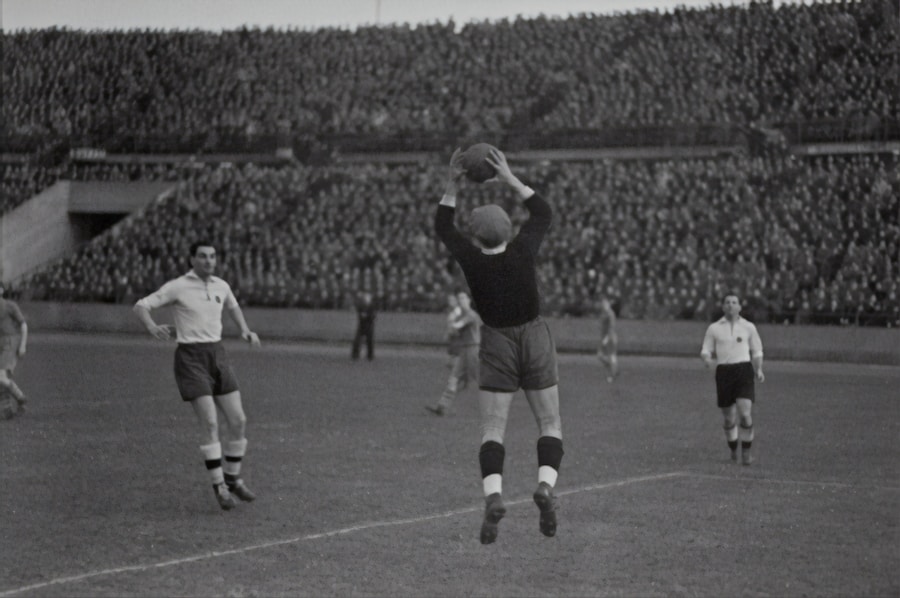Understanding the Importance of Mental Toughness in Sports
Mental toughness is a concept that is often associated with sports and athletic performance. It refers to the ability to stay focused, motivated, and resilient in the face of challenges and setbacks. While physical strength and skill are important in sports, mental toughness plays a crucial role in determining an athlete’s success. It is what sets apart the average athletes from the exceptional ones.
The importance of mental toughness in sports cannot be overstated. It is what allows athletes to push through physical pain, overcome obstacles, and perform at their best even under pressure. In fact, many experts believe that mental toughness is the key differentiator between athletes who succeed and those who fall short. It is what enables athletes to stay calm and focused in high-stress situations, bounce back from failure, and maintain confidence in their abilities.
Mental toughness can greatly enhance an athlete’s performance in various ways. Firstly, it allows athletes to maintain focus and concentration throughout a game or competition. This is crucial for making split-second decisions, reacting quickly to changing situations, and executing skills with precision. Without mental toughness, athletes may become easily distracted or lose focus, leading to mistakes and poor performance.
Secondly, mental toughness helps athletes overcome challenges and setbacks. In sports, there are bound to be obstacles and failures along the way. Whether it’s a missed shot, a lost match, or a career-threatening injury, mental toughness allows athletes to bounce back from these setbacks and continue striving for success. It helps them maintain a positive mindset, learn from their mistakes, and keep pushing forward.
The Science Behind Mental Toughness: How the Mind Affects Athletic Performance
The psychological factors that contribute to mental toughness are complex and multifaceted. One key factor is mindset – the beliefs and attitudes that an athlete holds about themselves and their abilities. A growth mindset, which is characterized by the belief that skills and abilities can be developed through effort and practice, is essential for mental toughness. It allows athletes to view challenges as opportunities for growth and improvement, rather than as threats or failures.
Another important factor is self-efficacy, which refers to an athlete’s belief in their own ability to succeed. Athletes with high self-efficacy are more likely to set challenging goals, persist in the face of adversity, and maintain confidence in their abilities. On the other hand, athletes with low self-efficacy may doubt their own capabilities and give up easily when faced with challenges.
Developing Resilience: Strategies for Building Mental Toughness
Developing resilience is a key aspect of building mental toughness in sports. Resilience refers to the ability to bounce back from failure, setbacks, and adversity. It is what allows athletes to keep going even when things get tough.
One practical tip for developing resilience is to embrace failure as a learning opportunity. Instead of viewing failure as a reflection of their abilities or worth, athletes can reframe it as a chance to learn and grow. By analyzing what went wrong and identifying areas for improvement, athletes can use failure as fuel for motivation and strive to do better next time.
Another important aspect of building resilience is perseverance. Athletes must be willing to put in the time, effort, and practice required to improve their skills and achieve their goals. This means staying committed and not giving up when faced with challenges or setbacks. It also means being willing to step outside of their comfort zone and take risks in order to grow and improve.
Setting Clear Goals: Harnessing the Power of Visualization and Positive Thinking
Setting clear goals is another strategy for building mental toughness in sports. Goals provide athletes with direction, motivation, and a sense of purpose. They help athletes stay focused on what they want to achieve and provide a roadmap for success.
In addition to setting clear goals, visualization and positive thinking can also enhance mental toughness. Visualization involves mentally rehearsing a desired outcome or performance in vivid detail. By visualizing success, athletes can build confidence, reduce anxiety, and improve their performance.
Positive thinking, on the other hand, involves cultivating a positive mindset and focusing on the strengths and successes rather than dwelling on failures or weaknesses. By adopting a positive outlook, athletes can maintain motivation, overcome self-doubt, and stay resilient in the face of challenges.
Embracing Failure: Turning Setbacks into Opportunities for Growth
Failure is an inevitable part of sports. Every athlete will experience setbacks and failures at some point in their career. However, what sets mentally tough athletes apart is their ability to embrace failure as an opportunity for growth.
Instead of viewing failure as a reflection of their abilities or worth, mentally tough athletes see it as a chance to learn and improve. They analyze what went wrong, identify areas for improvement, and use failure as fuel for motivation. They understand that failure is not the end of the road, but rather a stepping stone towards success.
One strategy for reframing failure is to focus on the process rather than the outcome. Instead of fixating on winning or losing, mentally tough athletes focus on the effort, preparation, and growth that they put into their performance. They understand that success is not solely determined by the outcome, but by the progress they make along the way.
Managing Pressure: Techniques for Staying Calm and Focused in High-Stress Situations
Pressure is a common factor in sports, especially in high-stakes competitions or important games. The ability to manage pressure and stay calm and focused is crucial for maintaining mental toughness.
One technique for managing pressure is deep breathing. Deep breathing helps activate the body’s relaxation response and counteract the physiological effects of stress. By taking slow, deep breaths, athletes can calm their nervous system, reduce anxiety, and improve their focus and concentration.
Another technique is to break down the task or competition into smaller, more manageable parts. By focusing on one step at a time, athletes can avoid becoming overwhelmed by the pressure and stay focused on the present moment. This can help them maintain clarity, make better decisions, and perform at their best.
Building Confidence: Cultivating a Strong Mindset to Overcome Doubt and Fear
Confidence is a key component of mental toughness. It is what allows athletes to believe in their abilities, take risks, and perform at their best. Without confidence, athletes may doubt themselves, second-guess their decisions, and hold back from giving their all.
Building and maintaining confidence requires a strong mindset. One strategy for building confidence is to focus on past successes and strengths. By reminding themselves of what they have achieved in the past and the skills they possess, athletes can boost their confidence and belief in their abilities.
Another strategy is to set achievable goals and celebrate small victories along the way. By setting realistic goals that are within their reach, athletes can build confidence as they achieve each milestone. Celebrating these small victories can provide a sense of accomplishment and reinforce the belief that they are capable of success.
The Role of Self-Talk: Harnessing the Power of Positive Affirmations
Self-talk refers to the internal dialogue that goes on in an athlete’s mind. It can greatly influence an athlete’s mindset and mental toughness. Positive self-talk involves using affirmations or positive statements to counteract negative thoughts or self-doubt.
Positive affirmations can help athletes build confidence, maintain motivation, and stay focused on their goals. By repeating positive statements such as “I am strong,” “I am capable,” or “I can do this,” athletes can reframe negative thoughts and replace them with positive ones.

It is important for athletes to be aware of their self-talk and actively work on replacing negative thoughts with positive ones. This can be done through daily affirmations, visualization exercises, or working with a mental coach or sports psychologist who can provide guidance and support.
The Importance of Mental Preparation: Strategies for Mental Toughness Training
Mental preparation is a crucial aspect of building mental toughness in sports. Just as athletes train their bodies physically, they must also train their minds to be strong, focused, and resilient.
One strategy for mental preparation is to develop pre-performance routines. These routines help athletes get into the right mindset before a game or competition. They can include activities such as visualization, deep breathing exercises, or listening to music that helps athletes feel calm and focused.
Another strategy is to practice mindfulness and present moment awareness. This involves being fully present and engaged in the current moment, rather than getting caught up in past failures or future worries. By practicing mindfulness, athletes can improve their focus, reduce anxiety, and perform at their best.
Seeking Support: Utilizing Mental Coaching and Sports Psychology for Optimal Performance
Seeking support from mental coaches and sports psychologists can greatly enhance an athlete’s mental toughness and performance. These professionals are trained to help athletes develop the skills and mindset needed to excel in sports.
Mental coaches can provide guidance, support, and strategies for building mental toughness. They can help athletes identify their strengths and weaknesses, set clear goals, develop effective coping strategies, and maintain motivation and focus.
Sports psychologists can also provide valuable insights into the psychological factors that contribute to mental toughness. They can help athletes understand their mindset, beliefs, and attitudes towards success and failure. They can also provide techniques for managing pressure, overcoming self-doubt, and staying resilient in the face of challenges.
In conclusion, mental toughness is a crucial aspect of sports performance. It allows athletes to stay focused, motivated, and resilient in the face of challenges and setbacks. By understanding the importance of mental toughness and implementing strategies for building it, athletes can enhance their performance and achieve their goals. Whether it’s developing resilience, setting clear goals, embracing failure, managing pressure, building confidence, or seeking support, there are numerous strategies that athletes can use to build mental toughness and excel in their athletic pursuits.

